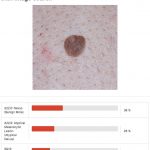 Last year I wrote about a fascinating AI technology that can accurately detect skin cancer. To prove its mettle, the AI was pitted against 21 certified dermatologists, and fared very well against their expert human rivals.
Last year I wrote about a fascinating AI technology that can accurately detect skin cancer. To prove its mettle, the AI was pitted against 21 certified dermatologists, and fared very well against their expert human rivals.
There are over 5 million cases of skin cancer in the US alone each year, and survival rates plummet the longer it remains undetected. Diagnosis is typically undertaken via a visual examination, both with the naked eye and a dermatoscope. If this still results in doubt, a biopsy is undertaken.
The approach undertaken by the Stanford team mirrors that of other recent breakthroughs in AI driven image analysis.
“We made a very powerful machine learning algorithm that learns from data,” the team say. “Instead of writing into computer code exactly what to look for, you let the algorithm figure it out.”
Taking tech to market
First Derm are taking this kind of technology to market with the launch of an AI powered API that they believe can assess any skin concern within seconds. The system utilizes a convolutional neural network (CNN) so that it constantly learns from the skin disease images it’s utilized on.
“We started out as an asynchronous teledermatology service – as CNNs have evolved we have been well positioned to use our unique data set. Thanks to an awesome team, we now have a great tool that can be used as a symptom checker for any skin concerns that we have named Skin Image Search™. It is still in beta and gets better by every month”, the company say.
The AI currently powers the company’s Skin Image Search Tool, which is available via any web browser. It’s been trained on a wide range of skin conditions, including rashes, hair loss, cancer lesions and genital concerns.
The image library contains what is believed to be the largest dataset of unique amateur smartphone images. This real-life dataset can help the system match for similar images, and the team believe is more reliable than systems trained upon ‘perfect’ clinical-grade images.
The system is currently in beta mode and will become more sensitive as it gains access to more and more images. The accuracy at the moment is approximately 80%, which the team believe is significantly better than the norm today, whereby they claim that roughly 50% of images are incorrectly labeled.
“Already today we are better than general doctors. In nine months time, with our continued research, we anticipate the AI to be comparable to the diagnostic accuracy of a dermatologist on any skin concern. Our preliminary Skin Image Search™ test-results have already caused some diagnostic debate within our group of dermatologists”, they explain.